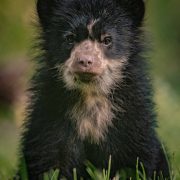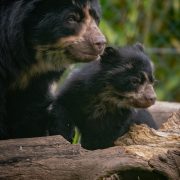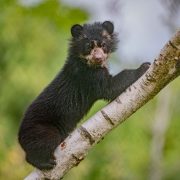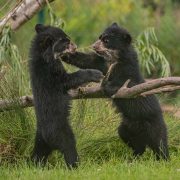The first set of Andean bear twins EVER to be born in the UK have emerged from their den at Chester Zoo.
The playful cubs were born in January, but have only now started to venture out and explore, having spent their first six months cuddled up by the protective side of their mum, Lima.
Revealed as one boy and one girl, the rare cubs were spotted enjoying some friendly rough and tumble and attempting to climb trees, before following mum back to their den for a well-deserved nap.
Our bear conservationists here at the zoo – which reopened this week after three months of closure – have named the adorable duo Pacha (female) and Mateo (male), and have hailed the birth of the cubs as “very, very special.” Experts estimate that fewer than 10,000 Andean bears remain in the wild.
PSSSTT
“Andean bears are incredibly shy animals and, for this reason, are still something of a mystery to conservationists. So to see mum Lima allowing her two little cubs to explore so freely and enjoy a bit of friendly rough and tumble is just wonderful – it’s very, very special. The twin cubs are so full of energy and their playful personalities are really starting to show – it looks like they will be keeping mum very busy!”
Lucy Edwards, Chester Zoo’s Assistant Team Manager of Carnivores
Lucy added: “Just a few weeks ago, while the zoo was closed, a small team of keepers and vets managed to give the cubs a quick check over and we’re very happy to report that both were given a clean bill of health. It’s great that we can now safely welcome back visitors and they can learn more about Andean bears and see the twins for themselves – an incredibly rare sight, even for conservationists studying them day in, day out in the field.”
Andean bears were originally made famous by the classic children’s character Paddington Bear who, although found in a London train station in the books, was known to be from ‘deepest, darkest Peru’.
Andean bears are the only species of bear to inhabit South America and, as well as Peru, they are found in Venezuela, Colombia, Ecuador and Bolivia. They are listed by the International Union for the Conservation of Nature (IUCN) as vulnerable to extinction.
Lucy continued:
“Mum, Lima, is doing an incredible job caring for her new cubs and they seem to be really thriving under her watchful eye. Her new arrivals are vital additions to the endangered species breeding programme, which is working to preserve the species, help conservationists to learn more about them and ultimately, protect the long-term future of these beautiful bears.”
“Alongside this important work in the zoo, our conservationists have also been working in Bolivia, alongside our partners, the local NGO PROMETA and the University of Oxford, to understand how Andean bears live in the wild. Together, we are striving to find new ways to prevent conflict between bears and humans – a key threat to this species. The project is the first of its kind in the region and aims to have bears and humans living side by side in harmony.”
Andean bears share their habitat with some of South America’s poorest and most vulnerable communities, whose livelihoods are being severely challenged by climate change.
Sadly, this means the bears are often targeted by farmers and land owners, as they can pose a threat to crops and livestock in their search for food sources, which are dwindling in their natural range. This is a direct result of habitat loss, brought about by mass-scale deforestation and climate change. Experts suggest that more than 30% of the forests in South America have disappeared in the last 20 years.
FIND OUT MORE

The fight isn’t over for us just yet,
WE STILL NEED YOUR HELP.
Thank you for all your support so far. Thanks for supporting us through donations, adoptions, fundraising and writing to your MP to help SAVE OUR ZOO. From the bottom of our hearts – thank you. There are still tough times ahead, but thanks for bearing with us.
NOW is the time to ACT FOR WILDLIFE. Conservation is CRITICAL; species are under threat. TOGETHER we can make a BIG difference. Take action TODAY and join us in PREVENTING EXTINCTION.



